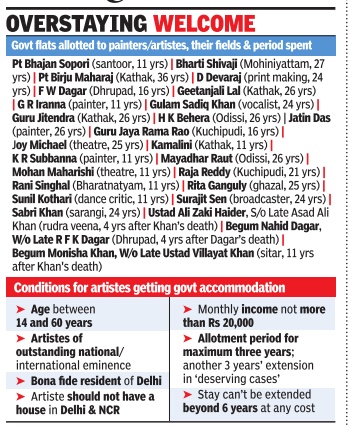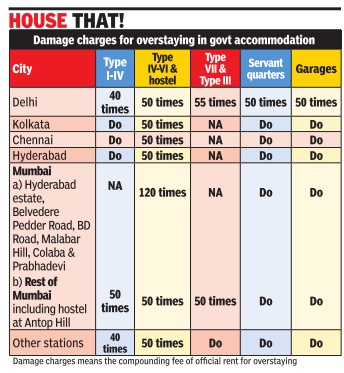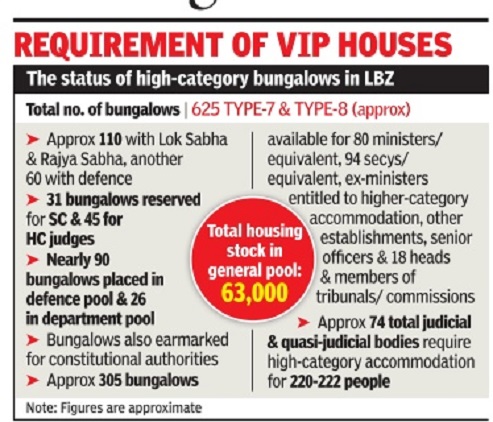Government accommodation: India

This is a collection of articles archived for the excellence of their content. |
Contents |
Artistes, houses for
The Times of India, Jun 16 2015
Dipak Dash
Artistes too latch on to govt houses
Politicians are not the only ones trying to hang on to government accommodations long after their term has expired. Prominent artistes too are overstaying their welcome. Several exponents from the field of music, dance and art are living in government flats for over 11 years and in some cases up to 36 years, paying a nominal licence fee against the limit of stay of six years. Sources said the licence fee for such accommodations in posh areas, including Lodhi Colony , Asian Games Village, Shahajahan Road, Kaka Nagar, Gulmohar Park, Pandara Road and R K Puram, is below Rs 1,000 per month.
Records accessed by TOI shows that none of the 27 occupants fall within the eligibility criteria set for government accommodation. The list includes Santoor maestro Pt Bhajan Sopori, Kathak exponents Pt Birju Maharaj and Geetanjali Lal, renowned painter Jatin Das, Odissi exponents H K Behera and Mayadhar Raut.
In three cases, the houses have been occupied by artistes' dependents for 4-11 years whereas the norm says, “in case of death of an allottee, the immediate family shall be allowed retention period of six months“. “This is blocking other young artists to get an accommodation in Delhi, who cannot afford a house in pursuit of their artistic endeavours,“ said an official.
Officials said the cabinet committee on accommodation has been giving extension to these occupants after cases are forwarded by the culture ministry . The latter has already sent the list of almost all these artists for further extension to the urban development ministry .
Delhi (Government of India)
Bungalows in the LBZ/ 2016
Scarcity of bungalows with no scope to construct any more in Lutyens' Delhi has put the government in a fix on how to meet the growing demand from senior politicians besides chairpersons and members of different commissions and quasi-judicial bodies.
Out of the nearly 625 bungalows in the top categories (Type-7 & Type-8) in central Delhi, only 305 are available under the `General Pool' to meet the demand of central ministers, secretaries, heads of constitutional authorities and ex-ministers awaiting accommodation from Lok Sabha and Rajya Sabha as per their entitlement.This category also takes care of demand of some institutions while 18 have been allotted to chairpersons and members of commissions and tribunals.
Sources said there is no problem or delay in providing accommodation to judges of the Supreme Court and Delhi high court as 76 bungalows are in the `Judges Pool'. But officials admitted that it's actually a problem to provide high category bungalows to ex-judges attached to tribunals and commissions, though they are entitled to get Type-7 and Type-8 accommodation.
Chief Justice of India T S Thakur had pointed out on Saturday how former SC judges were declining to serve as chairmen of tribunals because the government “is not ready even to do the bare minimum of providing a dignified place for them to occupy“. In his response, law minister Ravi Shankar Prasad had said it was not possible to provide every retired judge with bungalows of same size as that of sitting judges.
While Type-8 bungalows have five bedrooms, Type-7 have four bedrooms. Both have servant quarters, lawns and garage.
Sources said there are about six dozen tribunals and commissions and they require about 220-222 houses. Till recently, there was no separate quota for chairpersons and members of tribunals and commissions, so they were getting accommodation from the `General Pool'.
The urban development ministry has pooled 38 Type-7 flats and 100 Type-6B flats in the Commonwealth Games Village to meet a part of this require ment. A few of these have already been allotted but in most cases, allottees are reluctant to take them, sources said.
TOI has learnt that in 2013, the UPA government had decided to develop a complex in Ghitorni in South Delhi where all tribunals would be located and residential facilities provided.But nothing has moved so far.
Officials said a group of ministers in the last government had recommended that ministries relating to the tribunals should pay a lump sum amount to office bearers for rent, travel and daily allowances rather than seeking government accommodation.
Lutyens' bungalows, occupied: 2017
Dipak Dash, 10% Lutyens' bungalows are still occupied by parties, Jan 30, 2017: The Times of India
Even a decade after the Supreme Court directive to get offices of political parties shifted from Lutyens' Bungalow Zone (LBZ), government data shows that 10 bungalows are still occupied by political parties.While the maximum four are occupied by Congress, BJP has two such properties in the heart of the country's capital.
The data submitted by the directorate of estates (DoE) to the Central Information Commission (CIC) said no fresh allotment was made after December 2010 when 4, Gurudwara Rakabganj Road was allotted to Bahujan Samaj Party.
The government decision to amalgamate three neighbouring bungalows into one and allot it to BSP had kicked up a political storm during UPA-2. The other parties occupying bungalows are Na tionalist Congress Party , Samajwadi Party and Communist Party of India.
According to details available on DoE's website, a total of 27 suites --18 single and nine double suites --in VP House have been allotted to political parties.
BJP and Congress occupy eight suites each. Janata Dal (United) has two suites while RJD, AIADMK, Shiv Sena, SAD, RLD, DMK, Janata Dal (S) and AAP occupy one each.
Following an SC order, all political parties were required to vacate properties in the LBZ and were given land in other places to build offices. They were required to give up their bungalows within three years of taking possession of the land.
While BJP has started building its office on Deen Dayal Upadhyay Marg, Congress is yet to start work to shift its offices out of the LBZ.
Congress has sought urban development ministry's permission to occupy the bungalows for three more years when it expects to complete building its new office.
Limits on government accommodation to officers
The Times of India, Sep 1, 2011
Govt must stop allotting two houses to babus: SC
The Supreme Court has faulted the practice of government servants retaining official accommodation from the place they are transferred out and occupying another at the place of posting.
A bench of Justices B S Chauhan and Swatanter Kumar disapproved the allotment of two houses to a single officer, one in Chandigarh and another in some part of the same state. It also termed as illegal the discretionary power exercised by the government to allow officials retain houses much beyond the 4-6 month period after their transfer or retirement.
Justice Kumar, writing the judgment for the bench, said: “These are matters of serious concern. There is no rule that can be brought to our notice or is available on the records providing that an officer who is posted outside Chandigarh/ Panchkula/Mohali and whose spouse is not entitled to any government accommodation of any category can be provided with two houses, one at the district/division level to which he is transferred and another at Chandigarh and its adjoining area.” TNN
Memorials in government bungalows
SC's orders
The Times of India, Nov 24 2015
But SC says no govt quarter shall be put to such use
Former President A P J Abdul Kalam's grand nephew A P J Syed Haja Ibrahim has quit the BJP, riled by the NDA government's refusal to earmark Kalam's official bungalow in Lutyens' Delhi as a `Knowledge Centre' as a mark of respect to the ex-president. Ibrahim might not know that the government's hands are tied in this case. The Supreme Court on July 5, 2013 had taken serious note of official bungalows in New Delhi and state capitals being under unauthorised occupation and had ordered eviction of illegal occupants.
A bench of Justices P Sathasivam and Ranjan Gogoi had taken objection to official residences getting converted into memorials for departed political leaders. It had ordered, “Henceforth, no memorials should be allowed in future in any government house earmarked for residential accommodation.“ Senior advocate Ranjit Kumar, who was amicus curiae in the matter that originated from Karnataka, had suggested to the court that all government houses which had been turned into memorials should be retrieved, memorials in government houses should be removed and no more memorials should be allowed.
However, the court found that government houses which were turned into memorials were allotted on lease to the respective trustssocieties by the cabinet committee on accommodation in accordance with the guidelines framed for the purpose as per the SC's direction in Shiv Sagar Tiwari vs Union of India case.
The lease agreements were executed between the government of India and the respective trusts for specified periods. “It would, therefore, be violation of the agreement if such houses are retrieved before the lease period is over,“ it said.
Overstaying in government accomodation
The Times of India, Aug 23 2016

Dipak Dash
Overstaying in government accommodation will now cost much more than just shelling out market rent, which is 40 to 55 times of what occupants pay every month. As per the new rules which have come into force, such occupants will have to shell out 10%, 20%, 30%, 40% and so on of the rent for every subsequent month in addition to the market rent until they vacate.There will also be similar hefty charges for those, including MPs, found subletting their accommodation. In a recent order, the directorate of estates (DoE) has introduced the additional charges in telescopic method from second month onwards in addition to the market rent (damage charges) to discourage government employees from overstaying in official accommodation. For example, a secre tary rank officer, who pays less than Rs 4,000 a month as government rent will end up paying at least Rs 2.10 lakh in the first month of overstaying. By the fifth month he she would have to pay at least Rs 3 lakh a month.
UD ministry officials said the new clause will hurt all, starting from class-IV employees to those at the highest level. The damage charges is higher in case of subletting. In such cases, the damage charges is two times of the market rent and there will be 10%, 20%, 30% and 40% extra charges every subsequent month.
One of the officials said till now MPs are not covered under these norms as they are not “government servants“.He said, “We are changing this norm since anyone allotted a government accommodation must not sublet any portion of the house. Subletting by anyone will be treated as unauthorised act and so the damage charge norms will be applicable.“
The UD ministry is also coming out with compilation of all the nearly 300 guidelines that have been issued since 1997 for allotment of government accommodation.
Retention after termination from service
`Can't retain quarters after sacking’, June 19, 2017: The Times of India
A person who has been terminated from service cannot be called an employee and is not entitled to retain the staff quarters provided by the employer, a Delhi court has said.
The court's observation came while upholding a man's eviction from staff quarters of Institute of Human Behaviour and Allied Sciences (IHBAS).
The court, while making the law clear to the man who was terminated from service in 2006 after working with IHBAS for nearly 26 years, said he could not show that he was an authorised occupant of the quarter.
“A person who has been terminated from service cannot be called a servant or employee, entitled to retain the quarters... No material is placed by the appellant (man) to show that he is an authorised occupant.
“He is no longer in service.The quarters were allotted to him only as a condition of service,“ district judge A S Jayachandra said. The accused argued that the eviction order was arbitrary and contrary to law and he wasn't given a chance to be heard.
Public Premises (Eviction of Unauthorised Occupants) Act amended/2017
Life just became more difficult for former ministers, MPs and bureaucrats who have overstayed their welcome in government accommodation. The Cabinet approved squeezing the time period for completing their eviction process to only three days against the present 60 days. Moreover, the overstaying allottees can now only approach high courts to get relief.
At present, persons overstaying can approach lower courts where it's easy to get stay orders. TOI in November had first reported the urban development ministry had moved this proposal seeking Cabinet approval. The urban development ministry has already hiked the penalty for overstaying in government accommodation, which is almost equivalent to market rent.
Annually , about 7,000-8,000 government houses get vaca ted in Delhi and in 20-25% cases the allottees continue to occupy them. Sources said nearly 200 allottees approach lower courts to get stay orders every year. The current lengthy process not only costs the exchequer in terms of pursuing court cases but also increases waiting time for those entitled to get official accommodation.
At present, about 70 officials are overstaying for more than two years after challenging eviction orders in different courts. Among them Himachal Pradesh CM Virbhadra Singh who has kept his accommodation for more than two years now after having approached a lower court in Delhi.
According to an official release, Cabinet has approved amendments in Public Premises (Eviction of Unauthorised Occupants) Act by inserting definition of “residential accommodation occupation“.It said, “The Amendment will enable the estate officer to apply summary proceedings for evicting unauthorised occupants from residential accommodations allotted for a fixed tenure or for a period heshe holds office on the basis of an order of allotment on licence basis, as non-vacation of such residences leads to unavailability of houses to new incumbents.“
